The global diet is getting sweeter, particularly when it comes to beverages
December 2, 2015
A new paper published in The Lancet Diabetes & Endocrinology highlights that the global diet is getting sweeter, particularly when it comes to beverages.
The Personal View paper was co-authored by Barry M. Popkin, PhD, W. R. Kenan Jr. Distinguished Professor of nutrition at the UNC Gillings School of Global Public Health and faculty fellow at the Carolina Population Center.
Previous research has shown that consuming foods and beverages with added caloric sweeteners is linked to an increased risk of weight gain, heart disease, diabetes and stroke. Currently, 68 percent of packaged foods and beverages in the United States contain caloric sweeteners, 74 percent include both caloric and low-calorie sweeteners, and just 5 percent are made with low-calorie sweeteners only.
“The added sweeteners come from hundreds of different versions of sugar, all of which have roughly the same health effect,” Popkin says.
He expects that in the absence of intervention, the rest of the world will move toward a similar pervasiveness of added sugars in the packaged food and beverage supply. Already, added sugars of all kinds are increasing rapidly in the diets of people living in developing countries.
Meanwhile, in many high-income countries – which currently are among the highest sugar consumers – researchers are beginning to see a slight decline in sugar consumption.
After analyzing nutritional datasets from around the world, the authors of the Personal View found that trends in sales of sugar-sweetened beverages are increasing especially rapidly in terms of calories sold per person per day and volume sold per person per day.
“Consumption of sugar-sweetened beverages is rising fastest in low- and middle-income countries in Latin America, the Caribbean, Africa, the Middle East, Asia and Oceania,” Popkin explains. “The four regions with the current highest consumption are Latin America, North America, Australasia and Western Europe, though intakes are beginning to decline in the latter three.”
Because of the major health risks – particularly weight gain and increased risk of diabetes, hypertension and many cardiovascular problems – associated with consumption of added caloric sweeteners, the World Health Organization (WHO) is promoting major initiatives to reduce intake worldwide.
Many governments have already implemented policies with this goal, including taxation, reduction of availability in schools, restrictions on marketing of sugary foods to children, public awareness campaigns and front-of-pack labeling.
Evidence of the effectiveness of these actions shows they are moving in the right direction, but the authors suggest governments should view them as a learning process and improve their design over time.
For example, one current challenge for policy makers is the absence of a consensus on the healthiness of fruit juices and beverages containing low-calorie sweeteners. Future research may better inform decisions about whether these are good substitutes for sugar-sweetened beverages, as the literature now suggests fruit juice consumption may also have adverse health effects and, although well-conducted studies suggest low-calorie diet sweeteners have positive effects, no global consensus exists strongly in favor of either of these potential substitutes.
While the latest data show that many countries now consume high levels of sugar-sweetened beverages, and other countries with lower intakes are seeing steep increases, the authors did find that consumption seems to be decreasing in countries with taxes on such products (e.g., Mexico, Finland, Hungary and France).
“Overall, it is clear that WHO, major scientific bodies like the U.S. Dietary Guidelines Panel of 2015 and most countries now recognize the importance of reducing consumption of sugar-sweetened beverages to improve public health,” Popkin concludes. “The continued evaluation of not only sugar taxes, but also new marketing controls and front-of-pack labeling, is important and represents the next frontier in attempting to reduce consumption of sugar-sweetened beverages and all food products with added caloric sweeteners.”
.
Gillings School of Global Public Health contact: David Pesci, director of communications, (919) 962-2600 or dpesci@unc.edu

